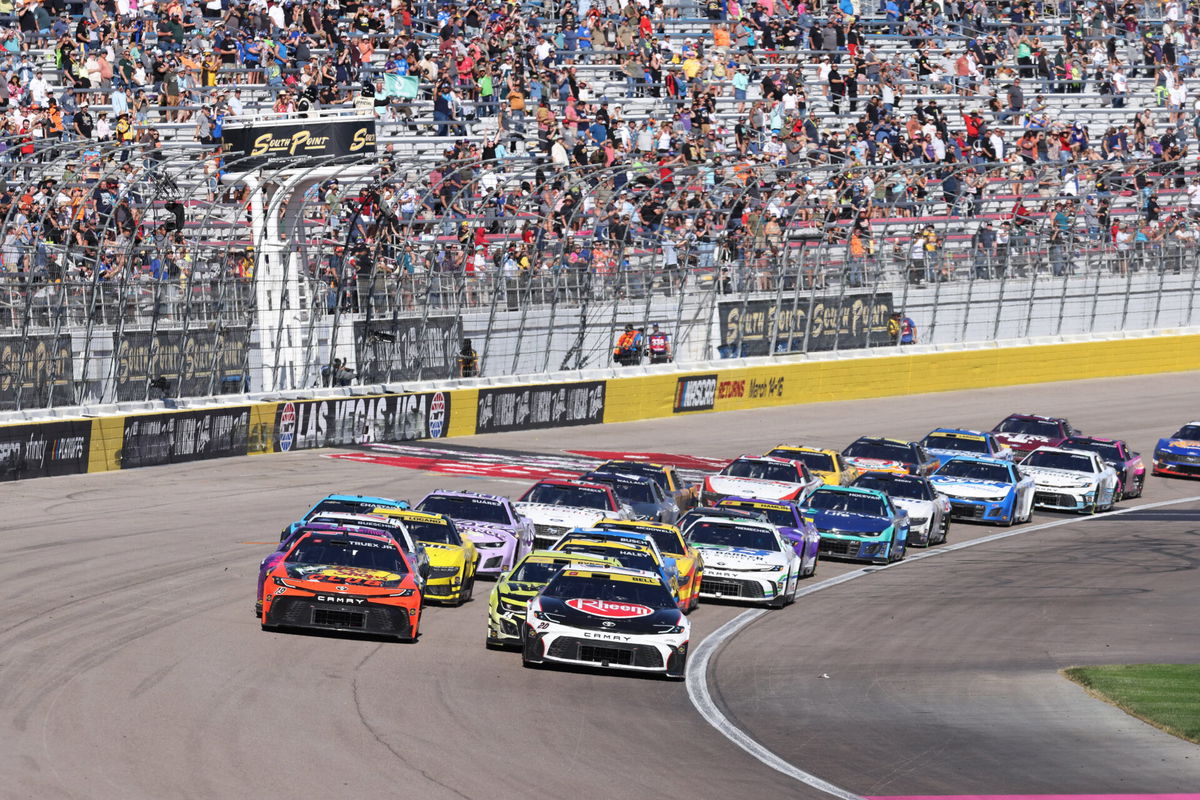
Imago
LAS VEGAS, NV – OCTOBER 20: Martin Truex, Jr. 19 Joe Gibbs Racing Bass Pro Shops Toyota and Christopher Bell 20 Joe Gibbs Racing Rheem Toyota lead a group of cars across the start line during a restart of the NASCAR, Motorsport, USA Cup Series South Point 400 race on Sunday, Oct. 20, 2024, at the Las Vegas Motor Speedway in Las Vegas, Nevada. Photo by Marc Sanchez/Icon Sportswire AUTO: OCT 20 NASCAR Cup Series South Point 400 EDITORIAL USE ONLY Icon1442410205177

Imago
LAS VEGAS, NV – OCTOBER 20: Martin Truex, Jr. 19 Joe Gibbs Racing Bass Pro Shops Toyota and Christopher Bell 20 Joe Gibbs Racing Rheem Toyota lead a group of cars across the start line during a restart of the NASCAR, Motorsport, USA Cup Series South Point 400 race on Sunday, Oct. 20, 2024, at the Las Vegas Motor Speedway in Las Vegas, Nevada. Photo by Marc Sanchez/Icon Sportswire AUTO: OCT 20 NASCAR Cup Series South Point 400 EDITORIAL USE ONLY Icon1442410205177
Back in the mid-2000s, rumors flew about a new player shaking up NASCAR when Toyota stepped in during 2007 as the first foreign manufacturer in the sport’s modern era. It joined Chevrolet, Ford, and Dodge, expanding the field to four. Now, NASCAR EVP John Probst notes they’re “very close” to adding a fifth, with Honda heavily rumored as the leading candidate.
Watch What’s Trending Now!
But, Honda’s motorsport manager Chuck Schifsky said, “No news to share at this time.” NASCAR currently has three manufacturers holding steady, after Dodge exited the Cup Series in 2012 and Toyota remains the newest. Now, there are small signs that spark curiosity about major changes ahead.
Honda has powered IndyCar engines since 2003, spanning over two decades of competition. Their dominance shows in multiple titles, as they clinched manufacturers’ championships in 2004, 2005, 2018, 2019, 2020, 2021, and 2025. Drivers like Scott Dixon grabbed crowns in 2008, 2013, 2018, and 2020 under Honda power, while recent sweeps highlight their competitive edge. So the question is: What lies ahead for Honda in open-wheel racing?
The condition fueling Honda’s NASCAR buzz
Motorsports journalist Adam Stern shared insights on the New Track Record podcast, pointing to Honda’s deliberate approach. “I’ve always heard that Honda likes to be very deliberate,” Stern said. “They like to take their time, process all the information, and wait till the kind of almost bitter end to make their decision.” This ties into Honda’s IndyCar contract running through 2026, where reports suggest they might exit, but positive signs have emerged lately.
Fox’s investment in IndyCar broadcasting might influence Honda’s decision to stay. But NASCAR garage talk leans toward Honda entering Cup, and Stern’s comments reflect months of speculation. It started heating up in early 2024, as Honda’s hybrid tech aligns with NASCAR’s push for electrification by 2026. Stern outlined a key condition.
“It looks like possibly that could be part of NASCAR changing up kind of their own formula, whereby they would start allowing manufacturers to almost have a little bit more of an IMSA-like system with BOP,” he explained. BOP means Balance of Performance, as it levels engines and aero for fair racing, and IMSA uses it in sports cars.
Honda wants more road-car-based engines too, while current NASCAR rules stick to pushrod V8s. A shift would let Honda adapt street tech, echoing IMSA’s approach since 2014. It helped diverse makes compete, and for Honda, it eased entry. Rumors resurged now due to IndyCar’s engine freeze until 2028, since Honda seeks flexibility.
If they leave IndyCar, it drops to one supplier, Chevrolet, which hurts diversity, but NASCAR gains a fourth OEM. It boosts global appeal, and Honda’s F1 exit in 2021 showed their strategic shifts.
Stern hoped for dual involvement, “Maybe they could pull off NASCAR and IndyCar. That would be obviously spectacular if they didn’t have to leave IndyCar,” he added. Effects ripple wide, as IndyCar risks stability without Honda, who has supplied since 2003. Losing them means scrambling for replacements, and past talks with Toyota failed. NASCAR benefits from Honda’s brand, drawing new fans.
Trackhouse Racing eyes a link, but the BOP condition is pivotal in modernizing NASCAR. Similar systems work in WEC too, and Honda’s estimated $51.9 billion market cap gives leverage. Decisions loom by late 2025, and if Honda jumps in, one team stands out as a potential partner.
Trackhouse targets Honda alliance
Trackhouse Racing is reportedly eyeing a Honda tie-up, with rumors linking them closely. “Honda is heavily rumored to be joining the NASCAR Cup Series in the near future,” an AutoRacing1 report stated, pegging Trackhouse for a 2027 entry.
The team runs Chevrolet now, so a switch needs approval, and Honda’s arrival hinges on rule tweaks. Trackhouse co-owner Justin Marks shows interest in growth, as their Project91 program tests international drivers, which fits Honda’s global reach.
Marks addressed expansion, “We are always looking for opportunities to grow our organization,” he said in an interview. Trackhouse fields three full-time cars, with Ross Chastain, Daniel Suarez, and Shane van Gisbergen driving them. A third charter came via the Stewart-Haas buyout in 2024, and Honda could power that.
The brand seeks a strong partner, and Trackhouse’s rise since 2021 impresses; they won at the Circuit of the Americas in 2022. Honda’s IndyCar success transfers well, but no deals yet.
A Honda-Trackhouse duo excites, as the rumor suggests, “Trackhouse Racing might team up with Honda if the brand joins NASCAR.” Reasons include shared innovation, Honda’s hybrids matching NASCAR’s future, and Trackhouse testing new ideas. Shane van Gisbergen’s 2023 Chicago win boosted them, and Honda adds resources. It could fund more cars, though officials stay quiet. But talks persist.








